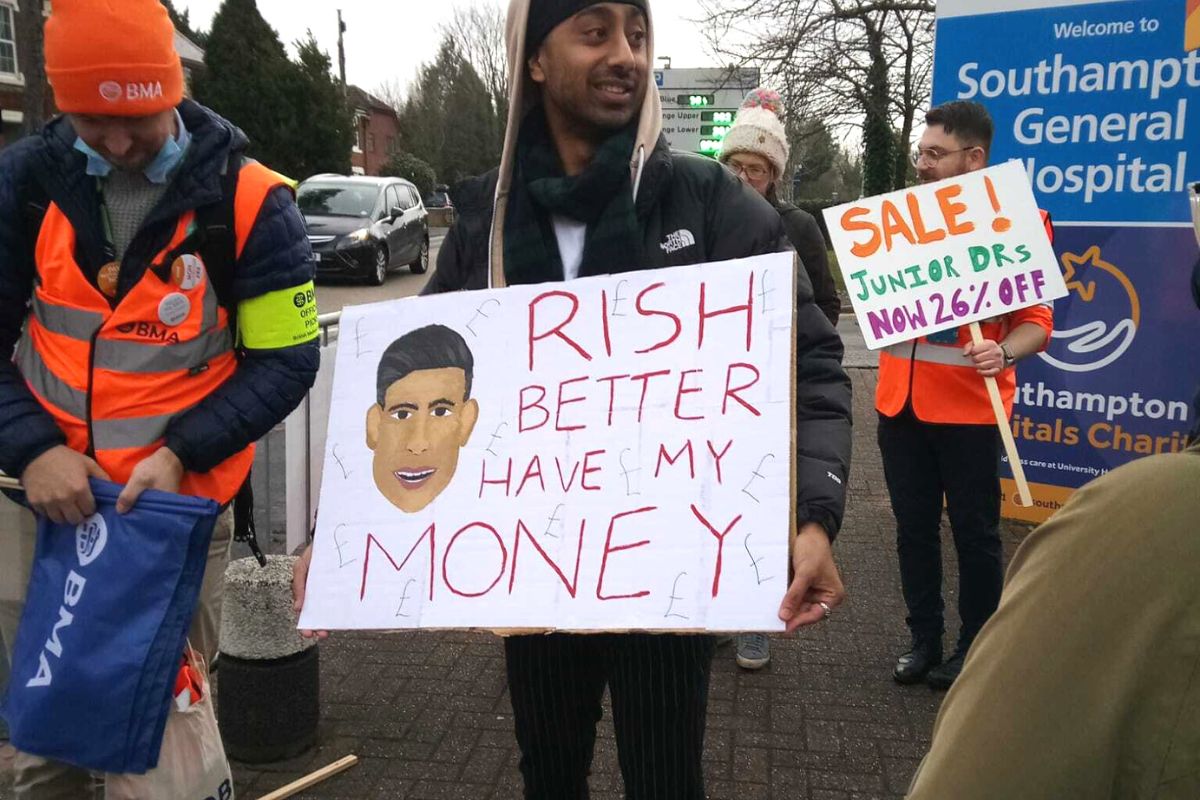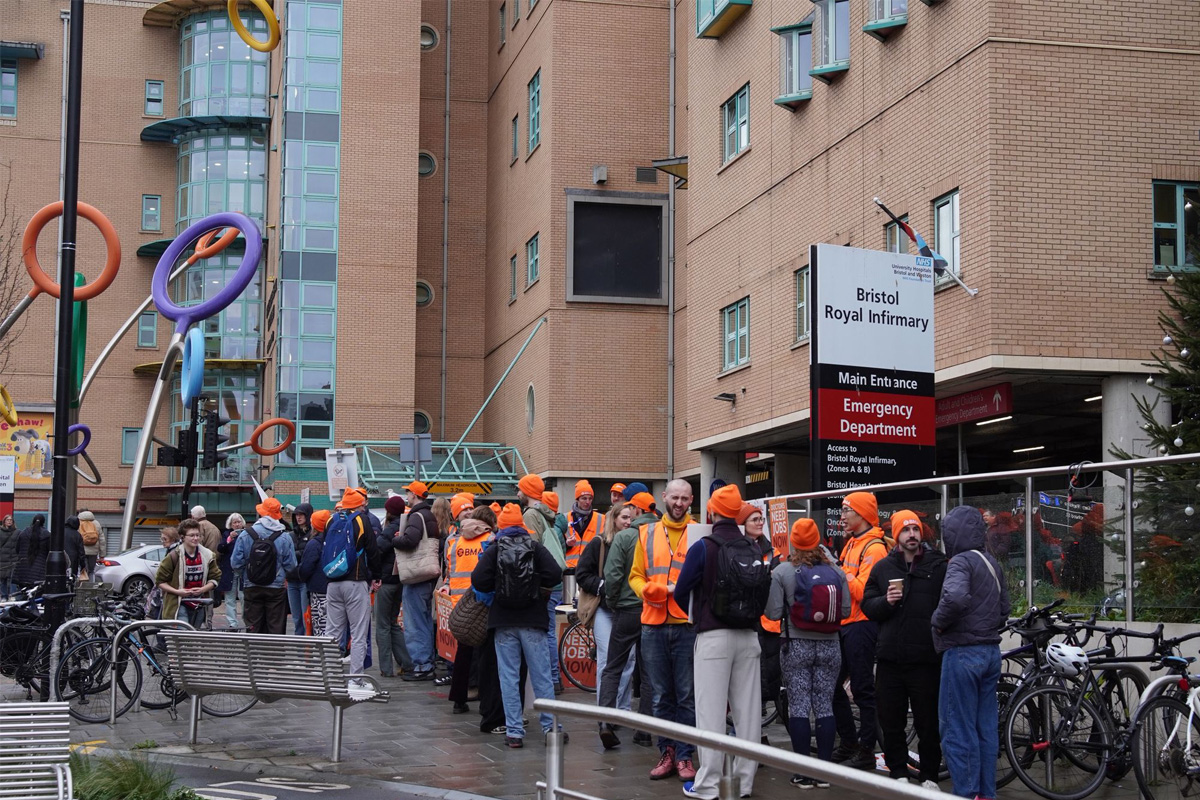Junior doctors are the latest workers to join the picket lines, with walkouts taking place this week, from 13-15 March.
The NHS and its staff are at breaking point. The urgent task is to coordinate strike action across the public sector, and fight for a nationalised, fully-funded healthcare system, under workers’ control.
Doctors’ Vote
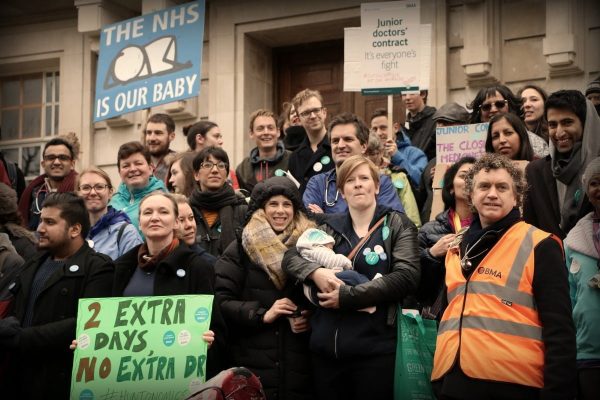 Junior doctors are fighting for full pay restoration, calculated as a 26.1% increase compared to current levels, to account for years of real-terms wage cuts.
Junior doctors are fighting for full pay restoration, calculated as a 26.1% increase compared to current levels, to account for years of real-terms wage cuts.
On 20 February, the British Medical Association (BMA), which represents doctors, announced the results of their ballot for industrial action. 98% of junior doctors voted in favour of striking, on a turnout of 77%.
This impressive ballot result is the product of hard work by rank-and-file activists, who have organised inside the BMA through the ‘Doctors’ Vote’ campaign to demand a proper pay rise.
More than pay
Austerity and privatisation have had a dire impact on conditions within the NHS. Health workers are being crushed by a decade-or-more of real-terms wage cuts, and by the ongoing cost-of-living crisis.
Junior doctors, for example, have gone from being a middle-class profession to one that – just like other layers of workers – is overworked and underpaid.
For a doctor in their second year of practice, monthly pay has dropped in real terms by £1,170.
On top of this, doctors find themselves working under increasingly dangerous conditions.
This is more than just a pay dispute, therefore. These strikes are also a response to the mass exodus of staff from the NHS.
According to a recent BMA survey, 79% of junior doctors often think about leaving the NHS. The majority cite pay erosion and worsening conditions as factors in their decision-making.
Those who choose to stay are faced with ‘moral injury’. 89% of junior doctors in the early years of their career feel torn between their desire to heal patients and the actions they have to take within the constraints of the system.
Escalation and dynamism
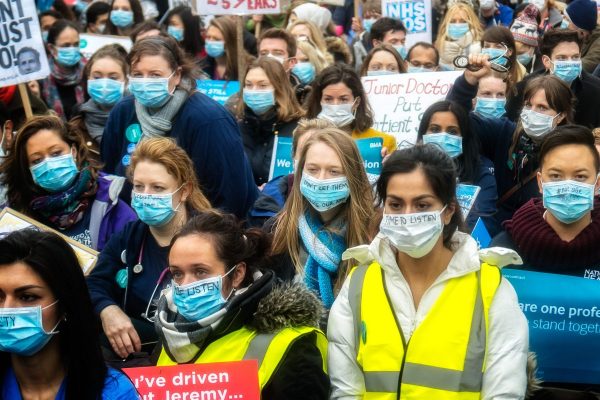 The BMA’s strike action will take the form of a 72-hour walkout of all junior doctors, including those in emergency and critical care.
The BMA’s strike action will take the form of a 72-hour walkout of all junior doctors, including those in emergency and critical care.
This represents an escalation from the junior doctors’ strikes in 2016. Back then, isolated one-day strikes – combined with internal tensions within the union over whether to withdraw emergency care – culminated in a compromise deal being struck between the BMA and the Department of Health.
This, in turn, demoralised a layer of junior doctors, pushing them out of trade union activity. The ongoing crisis in the NHS, however, with pay and conditions facing continued attacks, has led to a renewed militancy amongst fresh layers of health workers.
The Doctors’ Vote campaign has been able to tap into this widespread discontent, channelling the anger in a productive direction.
In the last few months, for example, strike champions have been recruited in every hospital. These activists have played an important role in building for the walkouts, distributing materials and helping to sign up doctors to the union.
This has injected a much-needed boost of energy into the union and its activity. A dynamic campaign, led by the rank and file, shows the way forward.
Junior doctors are also reaching out to other sections of the working class: expressing solidarity with other strikers and organising picket lines across the country.
This is already having an impact, as BMA members will be joined on the pickets by their colleagues from the British Dental Association.
Lies and slanders
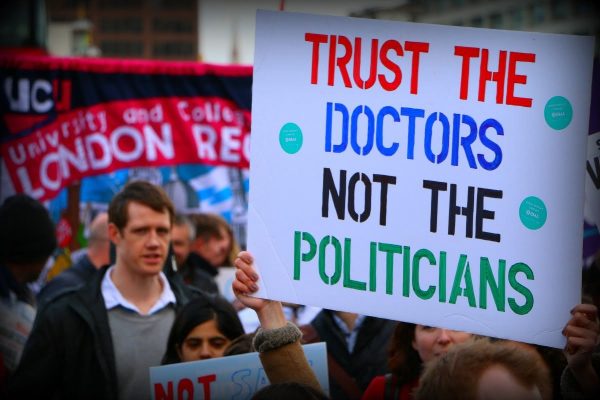 The Tories – in cahoots with the gutter press – will no doubt wage an all-out war on striking doctors, as they have with other workers.
The Tories – in cahoots with the gutter press – will no doubt wage an all-out war on striking doctors, as they have with other workers.
They will whip up a vicious campaign of lies and slanders. We will be accused of being greedy, spoiled, and lazy; of putting patients in harm’s way.
Let us be absolutely clear: the fault for the crisis in the NHS lays squarely at the feet of the Tories and the bosses’ system they represent. They have callously gutted health and social care, selling off the most profitable services to their big business chums.
These private parasites are making record profits at the expense of hundreds of thousands of tireless NHS staff, who are constantly forced to work longer and more gruelling shifts.
Patients inevitably suffer the consequences of this strained workforce. One senior healthcare official has estimated, for example, that 500 patients are dying every week due to delays in A&E.
As with other recent strikes, however, the Tories’ lies will struggle to cut through. The public overwhelmingly backs the NHS and its workers. One recent poll revealed that 56% of people believe that newly-qualified doctors are not paid enough. Our action is therefore likely to receive widespread support from ordinary people, and from the rest of the labour movement.
Unite the struggles
 The stakes are high for junior doctors. The crisis in the NHS is not going away. The damage done is already extensive. And neither the Tories nor Starmer’s Labour are prepared to offer the necessary solutions, as they are both wedded to austerity and privatisation – the logic of capitalism in crisis.
The stakes are high for junior doctors. The crisis in the NHS is not going away. The damage done is already extensive. And neither the Tories nor Starmer’s Labour are prepared to offer the necessary solutions, as they are both wedded to austerity and privatisation – the logic of capitalism in crisis.
Instead, we – along with other health workers – will need to trust in our own strength.
To start, the current wave of strikes should be coordinated across the entire NHS and public sector. This not only includes disputes being waged by nurses, healthcare assistants, cleaners, dentists, and physiotherapists, but also teachers, rail workers, and posties.
To realise and strengthen this united action, we need to join our struggles up from top to bottom. This includes forming cross-union strike committees in every hospital, to bring different health workers together at a rank-and-file level.
The BMA should also promote regular union branch meetings in every workplace, to help involve and integrate new layers of activists in the democratic running of the union as the strike progresses. This will allow us to keep the momentum going beyond the first round of action.
Socialist solution
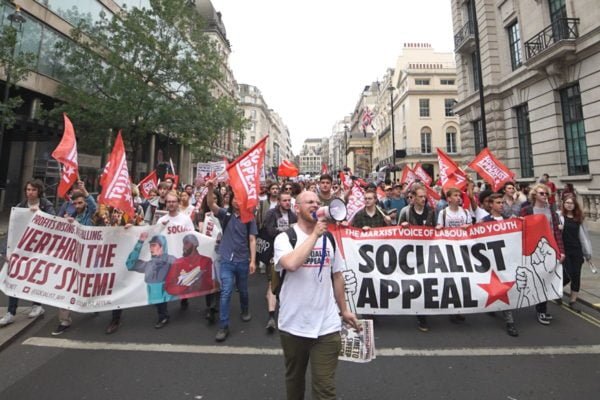 Ultimately, the only lasting solution for the NHS is a political one. Health workers must therefore organise around a bold socialist programme to tackle the problem at its root.
Ultimately, the only lasting solution for the NHS is a political one. Health workers must therefore organise around a bold socialist programme to tackle the problem at its root.
This should include demands to reverse all privatisation and outsourcing of jobs and services; to replace bureaucratic management with workers’ control; and to conduct a mass union-led recruitment campaign, in order to end staff shortages.
Such measures should be funded by expropriating and nationalising Big Pharma, the private healthcare companies, the banks, and other major monopolies. All these vultures have made more than enough money at our expense!
The Tories are languishing in the polls and have their backs to the wall. A mass campaign of militant, coordinated public sector strikes has the potential to topple this rotten government.
NHS workers can play a key part in this struggle. We have a world to win. Let’s seize this chance.

